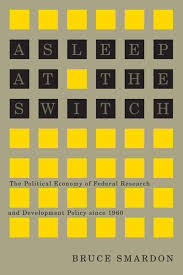ANALYSIS From CBC News
Canada’s research dilemma is that companies don’t do it here
Ten-year study says repairs needed for rebound will be costly and difficult
REBLOGGED: By Don Pittis, CBC News Posted: May 15, 2015 5:00 AM ET Last Updated: May 15, 2015 6:31 AM ET

Northern Electric was a domestic Canadian technology success story that became the telecom equipment giant Nortel Networks. But when Nortel failed, the lack of an R&D hub meant there were no startups to replace it. (The Canadian Press)
As Stephen Harper handed out more tax breaks for Canadian manufacturers in Windsor, Ont., yesterday, you might ask, “With that kind of support, why is Canada’s industrial economy in such bad shape?” Political economist Bruce Smardon thinks he has the answer.
Smardon says companies operating in Canada just aren’t spending enough on domestic research and development, and the Harper government is only the latest in a long line of governments, stretching back to that of John A. Macdonald, that have contributed to the problem.
As China’s resource-hungry economy goes off the boil, taking Canada’s resource producers with it, everyone including Bank of Canada governor Stephen Poloz, has been waiting for a rebound in Canada’s industrial economy.
But there are growing fears such a Canadian rebound is not on the cards. As the Globe and Mail’s Scott Barlow reported last week (paywall), despite having the top university for generating new tech startups, Canada has repeatedly failed to become a hub for industrial innovation.
Best in North America
Interviewed by the New York Times, the president of the startup generator Y Combinator, Sam Altman, called the University of Waterloo the school that stood out in North America for creating new ideas that turned into companies.
But as Barlow reported, there is statistical evidence that Waterloo’s success has not translated into R&D success, as Canadian industrial innovation continues to decline.
After 10 years of research, Smardon thinks his recent book, Asleep at the Switch — short-listed this year for one of Canada’s most prestigious academic book awards — provides the answer.
Political science professor Bruce Smardon’s book, Asleep at the Switch, examining Canada’s R&D failure, has been short-listed for one of Canada’s most prestigious academic prizes. (McGill-Queen’s University Press)
And, believe it or not, Smardon traces the chain of events back to Canada’s first prime minister and his tariff policy of 1879. Paradoxically, those rules were put in place to protect Canadian manufacturers from cheap U.S. goods, that were in turn protected by U.S. tariff walls.
Central Canadian boom
For the industries of central Canada, the tariff barriers worked. In the years before the First World War, says Smardon, Canada was second only to the United States in creating an economy of mass production and mass consumption, where workers could afford to buy the products they produced.
However, prevented by tariffs from exporting U.S. goods to Canada, American companies did the next best thing. They started, or bought, branch plants north of the border, wholly- or partly-owned subsidiaries that used U.S. technology in Canadian factories.
Smardon says that started a trend that continues today. The majority of R&D was being done in the home country of the industrial parent, not in the Canadian subsidiaries. And in the Mulroney and Chrétien era of free trade, he says, relatively high-tech branch plants, such as Inglis and Westinghouse, started to close as products were supplied more efficiently by the U.S. parent factories.
There were Canadian R&D stars such as Nortel and Blackberry, says Smardon. But they were exceptions. And when those stars began to set, the lack of a traditional R&D hub in Canada meant there were few young research-based companies ready to come up and replace them.
Tax credit paradox
The paradox, he says, is that Canadian taxpayers have spent a fortune on R&D tax credits. The 2011 Jenkins report showed that as a percentage of GDP, Canadian R&D tax incentives were higher than anyplace else. But as Barlow showed, Canadian R&D still lags behind.
The reason, Smardon concludes, is that while taxpayers fork out for R&D, industrial R&D doesn’t happen here but in traditional R&D hubs abroad. He says that free trade agreements and a longstanding view by Canadian governments that business knows best mean it’s very difficult to put conditions on how that money is spent.
“If we are concerned with developing a manufacturing base in the more advanced research intensive sectors, we’re going to have to have incentive programs at the very minimum, that are clear in insuring that any incentives are used to develop products and processes in Canada,” says Smardon. “They’ve got to think through how that can be done.”
But Smardon is not optimistic. He says that free trade and the free market philosophy has become so entrenched in Canadian thinking that it’s impossible to change.
Market rules
He says that is why the Harper government became so enamoured with the business of pumping and exporting unprocessed oil and gas while the Canadian industrial economy crumbled. It was exactly what the global free market wanted.
It may indeed be that global market forces decide Canada is an icy wasteland that is best at producing raw materials. It may decide that the best way to use our brilliant young people is to send them to California to develop their business ideas there.
But if we want more than that, perhaps handing out ineffective tax incentives is not going to be enough.







